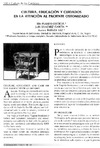Please use this identifier to cite or link to this item:
https://accedacris.ulpgc.es/jspui/handle/10553/105975
| DC Field | Value | Language |
|---|---|---|
| dc.contributor.author | Pulido Justicia, Rita | en_US |
| dc.contributor.author | Sánchez García, Judit | en_US |
| dc.contributor.author | Baraza Saz, María Aurora | en_US |
| dc.date.accessioned | 2021-03-19T17:26:47Z | - |
| dc.date.available | 2021-03-19T17:26:47Z | - |
| dc.date.issued | 2001 | en_US |
| dc.identifier.issn | 1138-1728 | en_US |
| dc.identifier.uri | https://accedacris.ulpgc.es/handle/10553/105975 | - |
| dc.description.abstract | Para la adecuada aplicación de los cuidados enfermeros es necesario el conocimiento antropológico de las personas a las que van dirigidos. Concretando en las personas ostomizadas debemos evidenciar los cambios, modificaciones y trastornos producidos por la nueva situación (ser portador de un estoma), a todos los niveles: físico, psicológico, social y cultural. Estos conocimientos nos proporcionan la base para proporcionar unos cuidados flexibles, adaptados e individualizados dirigidos a prevenir, disminuir o solucionar los problemas que puedan presentar. Nos basamos en la visión holística y humanista de Virginia Henderson y en la autoridad y autonomía que tenemos las enfermeras para tratar las alteraciones que presenta la persona para cubrir de forma satisfactoria e independiente sus necesidades básicas. Hemos realizado un revisión bibliográfica para conocer cómo la cultura y la educación afectan a la aceptación y al logro de la independencia de la persona ostomizada. | en_US |
| dc.description.abstract | Adequate Nursing care demands anthropological knowledge of the people who are to be cared for. Patients with an ostomy experience changes, alterations and disturbances by their new situation at all levels: physical, psychological, social and cultural. This knowledge provides us with the basis for flexible, adapted and individualised care in order to prevent, minimise or sort out the problems that may arise. Our work is based upon Virginia Henderson's holistic and humanistic perspective and nurses' autonomy and authority to deal with the patient's trouble and satisfactory and independently fulfill his/her basic needs. Literature has been reviewed in search of the ways in which culture and education determine acceptance and independence of the patient with an ostomy. | en_US |
| dc.language | spa | en_US |
| dc.relation.ispartof | Cultura de los Cuidados | en_US |
| dc.source | Cultura de los Cuidados [ISSN 1138-1728], n. 10, p. 100-108 | en_US |
| dc.subject | 32 Ciencias médicas | en_US |
| dc.subject | 3201 Ciencias clínicas | en_US |
| dc.subject.other | Atención al paciente | en_US |
| dc.subject.other | Ostomía | en_US |
| dc.title | Cultura, educación y cuidados en la atención al paciente ostomizado | en_US |
| dc.type | info:eu-repo/semantics/Article | en_US |
| dc.type | article | en_US |
| dc.identifier.doi | 10.14198/cuid.2001.10.13 | en_US |
| dc.description.lastpage | 108 | en_US |
| dc.identifier.issue | 10 | - |
| dc.description.firstpage | 100 | en_US |
| dc.investigacion | Ciencias de la Salud | en_US |
| dc.type2 | Artículo | en_US |
| dc.description.numberofpages | 9 | en_US |
| dc.utils.revision | Sí | en_US |
| dc.identifier.ulpgc | Sí | en_US |
| dc.contributor.buulpgc | BU-MED | en_US |
| dc.description.esci | ESCI | |
| item.grantfulltext | open | - |
| item.fulltext | Con texto completo | - |
| crisitem.author.dept | Departamento de Enfermería | - |
| crisitem.author.dept | GIR IUIBS: Tecnología Médica y Audiovisual | - |
| crisitem.author.dept | IU de Investigaciones Biomédicas y Sanitarias | - |
| crisitem.author.parentorg | IU de Investigaciones Biomédicas y Sanitarias | - |
| crisitem.author.fullName | Sánchez García, Judit | - |
| crisitem.author.fullName | Baraza Saz,María Aurora | - |
| Appears in Collections: | Artículos | |
Page view(s) 1
620
checked on Jan 9, 2026
Download(s)
365
checked on Jan 9, 2026
Google ScholarTM
Check
Altmetric
Share
Export metadata
Items in accedaCRIS are protected by copyright, with all rights reserved, unless otherwise indicated.
